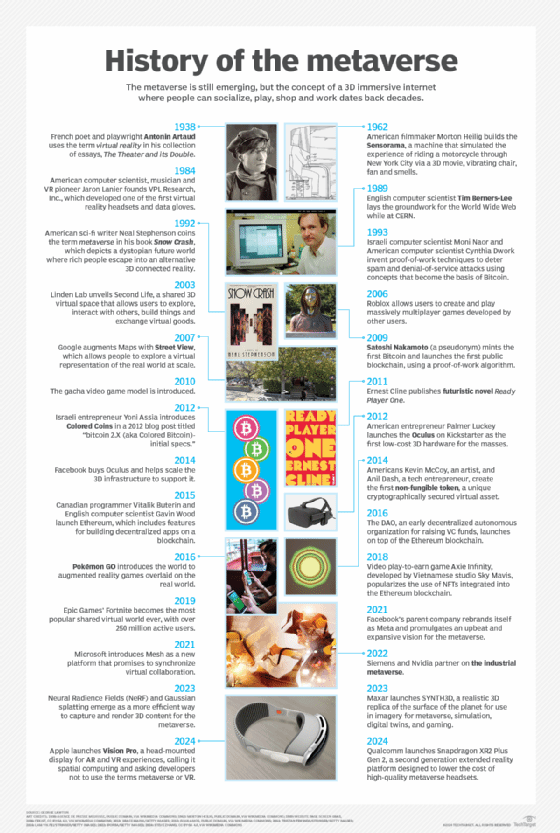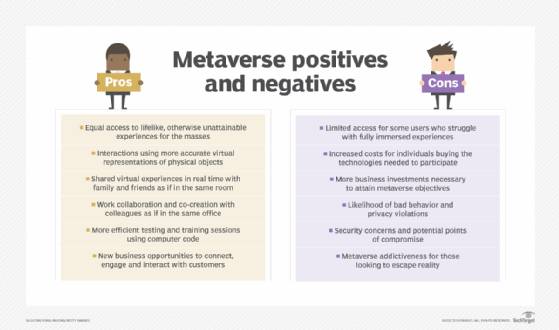18 real-world use cases of the metaverse, plus examples
Use cases for the still-developing metaverse are growing as the technologies that enable this next iteration of the internet mature. Here are 18 enterprise and consumer examples.
Despite several years of hype and anticipation, the metaverse remains in its early days.
But the technologies that enable the metaverse -- from artificial intelligence to smart goggles -- are advancing and bringing it closer to reality -- and eventually widespread use, according to Samantha G. Wolfe, founder of marketing consultancy PitchFWD.
"We're not there yet, and in order to get there, there has to be a convergence of different technologies, which seems to be happening," said Wolfe, an adjunct professor at the NYU Steinhardt School and co-author of Metaversed: See Beyond The Hype.
"When everything can be augmented, when we can walk into a virtual reality anywhere and anytime we want … it's going to change everything, just like the internet," Wolfe added.
Although that vision of the metaverse is still a ways off, many use cases for this next iteration of the internet have emerged. From virtual conferences and collaborative workspaces to immersive education and new retail experiences, the metaverse is already demonstrating its potential. Here are 18 existing and maturing use cases worth knowing about.
 Glenn Platt
Glenn Platt
1. Gaming
Gaming is among the earliest and most prevalent uses of the metaverse, said Glenn Platt, professor of interactive media studies at Miami University's Farmer School of Business. There are several reasons why gaming platforms lead in metaverse adoption. Many gamers already have the hardware to engage with the metaverse, and they've shown more enthusiasm for metaverse experiences. Additionally, gaming companies have outpaced other metaverse platforms in developing immersive content and experiences. The popularity of Second Life, Roblox and Minecraft attests to that.
 Samantha G. Wolfe
Samantha G. Wolfe
2. Virtual events
People also are coming together to enjoy events, particularly live-like shows such as concerts, "where people can feel a vague sense of presence and of being together even if they're not physically together," Wolfe said. Performers including Travis Scott and Ariana Grande have made the foray into the metaverse, teaming up with Fortnight to offer fans the option of seeing them in concert in the metaverse. Experts said they expect in the future to see more immersive events, such as football games and other sporting matches.
 Chris Johnson
Chris Johnson
3. Immersive entertainment
Similarly, the metaverse allows for new types of entertainment experiences, enabled by "new ways of engaging and collaborating," said Chris Johnson, a partner at management consulting firm Bain who co-leads the firm's Global Technology/Strategy interlock. Some experts cited Pokemon Go, an augmented reality (AR) mobile game released in 2016, as a prototype of the kind of entertainment the metaverse eventually will deliver. Others said they expect the metaverse to enable immersive 3D storytelling, the next generation of transmedia -- something that today uses video, text and games to tell a story in two dimensions.
4. More effective training
Training is another big use case for the metaverse, with many organizations already using the technology to train their workers, said Allan Cook, a managing director with Deloitte Digital. The metaverse replicates hands-on experiences, which have been proven to be more effective for training than content delivered via lectures, text or video. It also allows trainees to repeat a task until they've mastered it -- with no wasted resources, and it allows workers to revisit training as needed for refreshers or practice. For example, surgeons use the metaverse to practice complex surgeries before they perform them on actual patients.
 Allan Cook
Allan Cook
Additionally, the metaverse creates a realistic version of work scenarios; it can, for example, simulate a construction site to teach workers how to stay safe in such circumstances. Furthermore, the metaverse allows workers to train for the extraordinary -- such as a fire on an oil rig in the ocean -- enabling them to build (in a safe environment and at a reasonable cost) the muscle memory required to handle such rare events.
"If training is too difficult, too expensive or too dangerous to do in the real world, why wouldn't you do it in an immersive one," said Cook, who as Deloitte's Digital Reality Business leader works with clients on virtual reality (VR), AR, mixed reality, and immersive strategies and experiences.
5. Next-generation education
Workers aren't the only ones who will benefit from learning in the metaverse. Platt said students of varying ages likely will have lessons delivered via metaverse-type experiences in the future. Additionally, Cook said the metaverse could bring gaming to those lessons, creating "edutainment" offerings which research has shown to be more engaging and more effective in making lessons stick. "The best way to learn is to do something enjoyable," he added.
6. Real-time virtual expert assistance
Wolfe said she expects the metaverse to enable people in all sorts of circumstances to gain real-time expert assistance. Such experiences already exist in limited areas, with companies using AR and VR to superimpose written instructions or video directions in workers' field of vision as they perform tasks for which they need such guidance. Additionally, some companies use metaverse-type technology to pair remote experts with field workers, giving those remote experts a view of what the workers are seeing and doing in the field so they can better guide those field workers through their jobs. Wolfe said people might someday have regular access to expert guidance for routine tasks, such as changing a car tire.
 Tibor Mérey
Tibor Mérey
7. Augmented life
The metaverse won't just augment tasks. Tibor Mérey, managing director and partner with BCG X, part of Boston Consulting Group, said he envisions the metaverse also helping people through their daily lives. Imagine, he said, being able to wear smart glasses that could put nametags on the guests at a party while you mingle -- ending the need to ask acquaintances to remind you of their names.
8. Virtual tourism and a world without geographic barriers
One of the most promising use cases, according to multiple experts, is the creation of an environment that eliminates geographic boundaries. Tourism is a big use case, they said, with the opportunity to explore nearby and far-flung locales when real-world travel isn't an option. The metaverse can also bridge geographic distances for friends and family members who can't physically be at big events -- parties, graduations, weddings, etc. The metaverse would let them attend such events almost as if they were there in person (versus just viewing pictures or a televised version), Platt explained.
9. A new world for socializing
Many people socialized on videoconferencing platforms during the pandemic, but they quickly realized the limits of socializing in that two-dimensional space. The metaverse, however, could offer an environment that's closer to real-life social situations, where avatars could move around to talk to different individuals and groups, Wolfe said. Platforms such as Second Life offer a version of such experiences already, with experts adding that individuals beyond gamers in the future may feel more comfortable socializing in such digital spaces as metaverse-enabling technologies evolve.
10. Imagination enablement
The metaverse can bring abstract ideas to life, Platt says. Consider, for example, how developers and architects have traditionally showcased new buildings using small-scale models. Imagine, instead, if they used the metaverse to bring visitors into an immersive world where they could see the finished structure in the proposed location. They could walk visitors through the building and even show them behind-the-scene views of the utilities or structural designs.
 Geoffrey Long
Geoffrey Long
11. Explorations of what-if scenarios
Similarly, the metaverse allows people to explore what-if scenarios in a more tangible way, said Geoffrey Long, an assistant professor in the Department of Emerging Technology in Business and Design at Miami University and director of its Games and Simulation program. Climate scientists, for example, could show urban planners what their cities would look like in a 50-year storm and a 100-year storm and then what their cities would look like in those scenarios if they add in various storm-mitigation strategies.
"You're adding data and artificial intelligence to show what this world would feel like with this change," Long explained. Some such uses of the metaverse exist today, experts added, pointing to the industrial use of digital twins for companies to explore the results of factory or product design additions and changes.

12. Exploration of environments off-limits to humans
This use case goes beyond tourism, Platt said. Rather, he said the metaverse could be used to create visibility and exploration of spaces that otherwise can't be seen. "The metaverse is really good at revealing hidden data, things that are not easily engaged with in real life because maybe they're too big or too small to see, like being inside a cell," Platt explained. He said he worked with a hospital system to create a metaverse training experience designed to immerse clinicians in a patient room that -- thanks to digital technologies -- illuminated all the infectious germs that typically exist in such spaces "to reveal the thing we don't see" yet still need to know is present.
13. Better collaboration
The widescale shift to remote work and videoconferencing for team meetings likewise exposed limits to that technology for collaboration, Platt said, noting that "it's hard to get body language cues or engage with physical objects" in that 2D space. The metaverse, however, could solve for those limitations as it would allow for more lifelike engagement with others and through the use of haptic technology enable people to engage in a physical way with digital objects.
14. More efficient R&D, design and prototyping
Companies of all kinds already use digital twins for research and development, design, prototyping and testing, experts said. Carmakers, for example, create new designs and test features in virtual spaces; aerospace companies do the same for their products. Experts said they expect more companies in more industries to do such work as the metaverse matures, letting them perform such work at a fraction of the time and cost required for R&D, design and testing in the real world with real materials.

15. Immersive participation
The metaverse can move people from spectator to participant, sources said. Someone can try ziplining in the virtual world and experience sensations similar to the real deal, perhaps to test their mettle before trying the activity in real life, Cook said. People could opt to feel what it's like to drive a race car or run the court in a pro basketball game, with the metaverse delivering an immersive experience that goes well beyond watching such events on a 2D screen.
 Manjeet Rege
Manjeet Rege
16. A new retail experience
Retailers now deliver some early metaverse-like experiences, offering customers a way to see how eyeglasses or other items look on them or how a couch looks in their homes. The metaverse will amp up and expand such experiences, said Manjeet Rege, professor and chair of the department of software engineering and data science at the University of St. Thomas and director of its Center for Applied Artificial Intelligence. A cruise ship company could let prospective customers tour the various cabin options to determine which would be the best option to book. Real estate agents could use the metaverse to routinely give tours of properties to prospective buyers. Carmakers could let prospective buyers test vehicles with different features and see how they'd look in different color models.
17. New market opportunities
Video game companies sell add-ons, skins and other virtual items to gamers. Apparel designers sell digital clothes and accessories in existing metaverse experiences, too, Cook said. That, though, could be just the start of new and expanded market opportunities. Cook and others said they anticipate businesses and entrepreneurs to identify new market opportunities as the metaverse continues to evolve and more people engage with and in it.
18. Yet-to-be-imagined possibilities
Although experts have varying definitions of the metaverse -- and debate whether the technology as it exists today is truly the metaverse -- they agreed that the current technology is at an early stage. As such, they also agreed that there are use cases for the metaverse that have yet to be imagined. As Wolfe said: "We don't yet know all the uses cases, but the future evolving use cases -- those are the really fun stuff."
Mary K. Pratt is an award-winning freelance journalist with a focus on covering enterprise IT and cybersecurity management.







